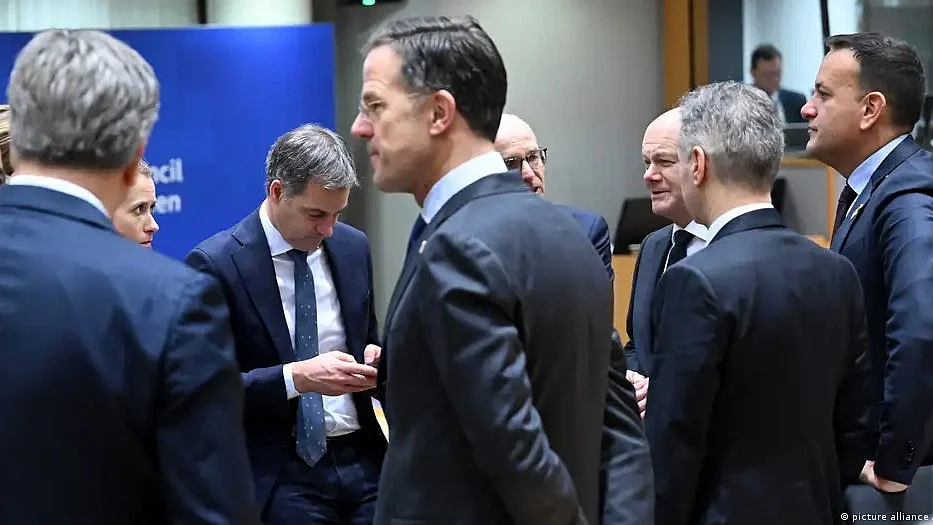No clear Gaza message from EU, despite ceasefire calls
Over 2 months in, the Palestinian death toll approaches 19,000. Yet after spending hours of discussion, the European Union could not issue a collective closing statement

Two months into the war in Gaza—with the combined reported death toll of Israelis and Palestinians nearing 20,000—European Union leaders spent hours discussing the conflict in Brussels on Friday, 15 December, but could not issue the customary collective closing statement.
"There are differences in feelings and sentiments about the idea of a humanitarian pause, supported by some; and a humanitarian ceasefire, supported by others," European Council president Charles Michel summed up in a post-summit press conference.
The senior EU official emphasised that all European leaders had strongly condemned Hamas' 7 October attacks in Israel, underlined Israel's right to defend itself and called for the release of more than 100 hostages Hamas still holds captive.
Michel also said EU leaders stressed the need for Israel to respect international law as it tries to root the militant Islamist group out of the Gaza Strip—the Palestinian territory that Hamas has controlled since 2007.
"Humanitarian support and aid must be guaranteed," said Michel, while also reiterating the EU's longstanding support for the two-state solution — in which the Palestinian people would eventually have their own full-fledged state to ensure long-term peace.
The bloc has struggled to speak in one voice since Hamas' October 7 onslaught in southern Israel killed 1,200 people and triggered a retaliatory Israeli bombing campaign, that has now killed at least 18,800 in the Gaza Strip, according to the Hamas-run Health Ministry.
While the 27 countries of the EU share a basic position, they are divided into those who sympathise more with Palestinians, like Belgium, Spain and Ireland; and those who closely back Israel, like Germany and Austria.
The EU, along with the US and others, designates Hamas as a terrorist organisation and has roundly condemned the 7 October attacks.
Situation in Gaza "remains a living nightmare"
When EU leaders last gathered in late October, they called for a "humanitarian pause" in fighting to let sorely needed aid into Gaza, which is under blockade by Israel. Earlier this week, Stephen Ryan, rapid deployment coordinator for the International Committee of the Red Cross, told DW that conditions for civilians in Gaza "remain a living nightmare".
In October, some member states called for a full-blown ceasefire but others, including Germany, argued that such a move would limit Israel's ability to defend itself.
On Friday, at the end of the two-day summit, leaders issued the following statement on the topic: "The European Council held an in-depth strategic debate on the Middle East."
"Let's stop the civilian killings"
Ahead of this week's summit, Belgium, Ireland, Malta and Spain led a fresh push to jointly call for a ceasefire.
"I think it's very clear there's been too many civilian killings. Let's stop the civilian killings," Belgian prime minister Alexander De Croo told reporters on Friday morning as talks began. "We as Europeans have to be very clear on that message."
Later in the day, after the summit ended, Irish prime minister Leo Varadkar said the balance was tipping in favour of those who supported a ceasefire, despite how things might appear at the moment.
"The majority of EU countries are now calling for a ceasefire. That's very clear from the UN votes the other day," Varadkar told reporters. Earlier this week, 17 of the EU's 27 member states voted in favour of a UN resolution calling for a ceasefire.
Varadkar said one or two member states believed a ceasefire "would prevent Israel from pursuing Hamas terrorists", though he himself did not share that view.
German chancellor Olaf Scholz painted a somewhat different picture at his post-summit press conference on Friday. Some states wanted to go beyond calls for pauses in fighting—which have already taken place—he said, but there was only unanimity on "humanitarian pauses", among other things.
Is the EU losing credibility over Gaza?
Joost Hiltermann, an analyst from the non-governmental organisation International Crisis Group, said lack of unity was undermining the bloc's international standing.
"The contradictory messages coming out of the EU over the past two months have damaged Europe's credibility in the Middle East," Hiltermann said in an emailed statement shared with DW ahead of the summit.
"If it wants to maintain strong relations with countries in the region, the EU should be speaking with one voice and be consistent with the principles on which it was founded," he said.
On Thursday, 14 December, Ireland's Varadakar made a similar argument. "I think the European Union has lost credibility because of our inability to take a stronger and more united position on Israel and Palestine," he said.
"We've lost credibility at the Global South, which actually is most of the world, because of what is perceived to be double standards. And there's some truth in that, quite frankly."
Follow us on: Facebook, Twitter, Google News, Instagram
Join our official telegram channel (@nationalherald) and stay updated with the latest headlines
Published: 16 Dec 2023, 9:55 AM
